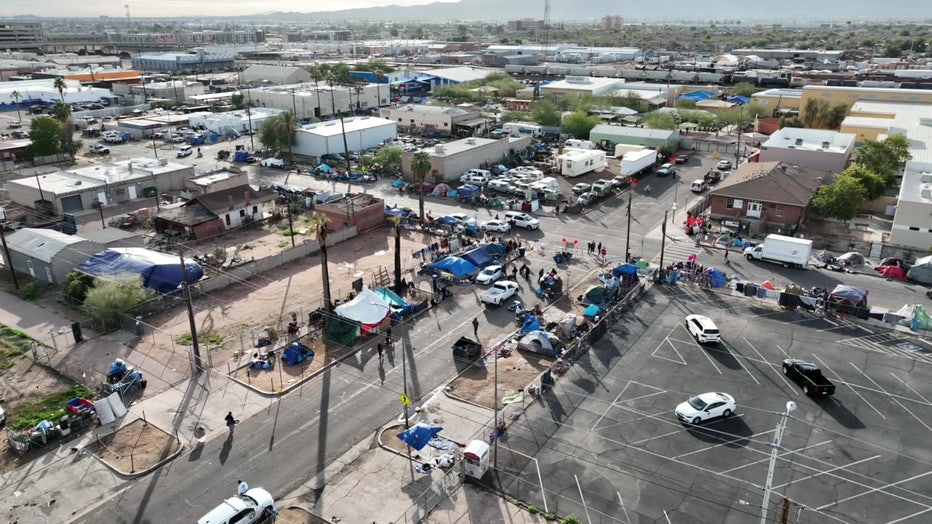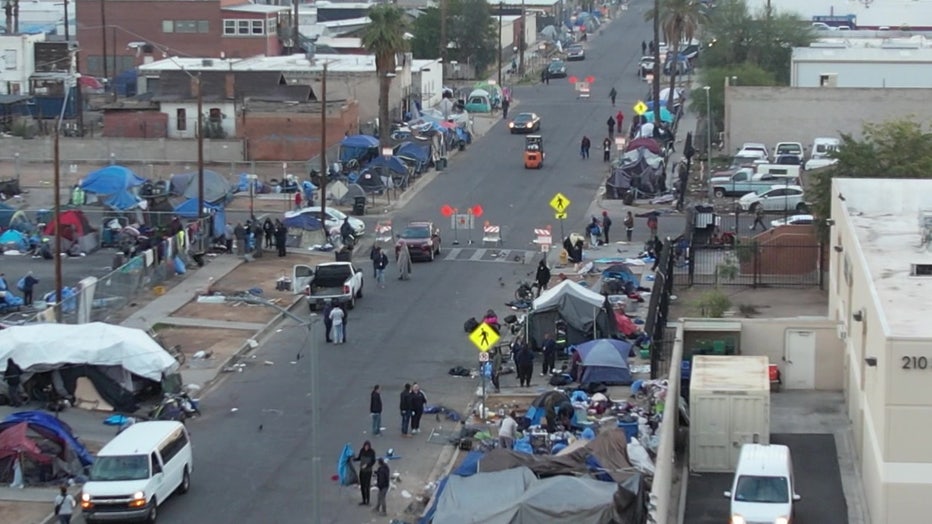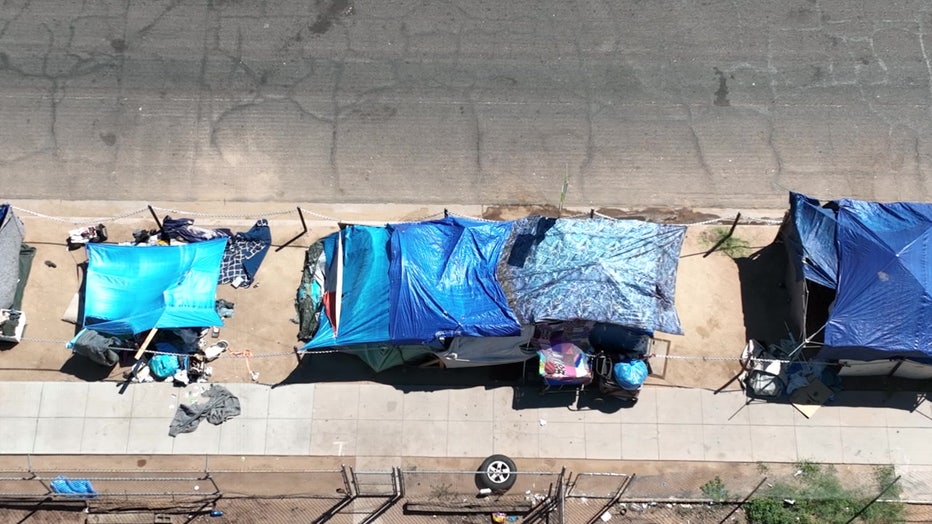The Zone Lawsuit: Judge orders Phoenix to clear out homeless encampment by Nov. 4
PHOENIX - The clock seems to be ticking on a homeless encampment near Downtown Phoenix that is known as "The Zone."
On Sept. 20, Maricopa County Superior Court Judge Scott A. Blaney issued a ruling on a lawsuit that was filed in connection with the homeless encampment, ruling that the city needs to clean out the encampment.
Here's what to know about the ruling, as well as the lawsuit.
Who filed the lawsuit?

According to the ruling, property owners, residents, and business owners who "live, work, or own businesses or property" in the area filed the lawsuit.
The lawsuit, according to court documents, alleges that the City of Phoenix has "created, maintained, and/or failed to abate a public nuisance" in the area now known as The Zone.
Why was the lawsuit filed?
"Plaintiffs base their action on allegations, many of which are undisputed, that there is a substantial portion of homeless individuals that have moved into the area and set up semi-permanent tent encampments on the public sidewalks, public grounds, and public rights of way," read a portion of the ruling. "Plaintiffs allege, inter alia, that the City refuses to enforce criminal and quality-of-life laws prohibiting loitering, disturbing the peace, drunken and disorderly conduct, drug use, domestic violence, and obstruction of streets, sidewalks, and other public grounds inside The Zone."
The term "inter alia," according to Cambridge Dictionary, means "among other things."
The ruling issued on Sept. 20 states that the city of Phoenix changed its policies around 2018 and 2019, where the city "intentionally stopped - or at least materially decreased - enforcement of criminal, health, and other quality of life statutes and ordinances at The Zone."
The policy change, according to the ruling, was based in part on a ruling issued by the 9th Circuit Court of Appeals in the case Martin v. City of Boise, where it was ruled that cities "could not enforce public camping laws against homeless individuals who do not have access to adequate temporary shelter, whether because they do not have the means to pay for it or because it is not available to them for free."

Since the policy change, the court ruling issued on Sept. 20 states that the area has experienced a number of negative impacts, including:
- A "dramatic increase in violent crime," including assault and homicide
- A "growing organized crime element," involving threats made against the homeless by other homeless people and people described as "'advocates' for the homeless," as well as individuals being forced to pay gangs or individuals to rent a spot for tents or structures. "Homeless victims are too afraid to speak with law enforcement or testify in court," a portion of the ruling states.
- A "proliferation in public drug use," including the use of needles and smoking of fentanyl and meth
- A "dramatic increase in property crimes"
- A biohazard problem involving human waste, food waste, and trash dumped onto the streets, with at least some of the biohazard ending up in waterways
In addition, the court ruling issued on Sept. 20 states that the plaintiffs in the case have tried to work with the city to resolve issues at The Zone, and presented a "seemingly cost-effective plan" for outdoor shelter space, prior to the lawsuit being filed.
"Despite their pleas for assistance, the City and its representatives did not materially respond to Plaintiffs’ concerns until the filing of this lawsuit was imminent," read a portion of the ruling.
Wasn't there another ruling on this case from earlier in the year?
Yes.
According to the ruling, a preliminary injunction was issued on March 27. At the time, a judge ruled that the City of Phoenix needs to, among other things, abate the nuisance caused by The Zone, and demonstrate its efforts and successes during a trial that took place on July 10.
"At trial, the City argued that it has already taken steps to clean out the Zone and that it will continue to do so even in the absence of a court mandate. The City asked the Court to vacate the Preliminary Injunction and dismiss the case," read a portion of the ruling issued on Sept. 20.
What does the Sept. 20 ruling call for?

The ruling on Sept. 20 states that while the court has received evidence that the City of Phoenix has taken steps to comply with the preliminary injunction issued on Mar. 27, and that the city's police department has stepped up law enforcement efforts at The Zone, the court has "s little confidence that the City will continue to abate the public nuisance and restore order to the Zone absent an order from this Court."
The judge also wrote, in his ruling, that city officials were "singularly focused on addressing and providing for the needs of homeless individuals occupying The Zone, without equal regard for the City’s constituent property owners, business owners, employers and their employees."
"In the absence of a court order, City officials will not complete the cleaning of the Zone and will not abate the public nuisance until they have attained the long-term goal of ending homelessness," read a portion of the ruling.
As a result, the ruling states that the City of Phoenix has:
- "Created and is maintaining a public nuisance in The Zone"
- "No discretion regarding whether to abate the public nuisance it has created and maintained in The Zone"
- "Abused its discretion through the arbitrary application of the law in The Zone"
The ruling calls for a number of things, including:
- Banning the city from "continuing to maintain a public nuisance on the public property in The Zone"
- Abating the nuisance, including the removal of all tents and other makeshift structures, by Nov. 4, 2023
- Maintain public property in The Zone that is free of tents, biohazardous materials including human waste, trash and drug paraphernalia, and individuals committing offenses against the public order.
The court also ruled that a provision in the preliminary injunction that prevented the city from enforcing its city code against Phoenix Kitchens, in reference to the erecting of artistic sculptures next to its building, will end on Nov. 4. In addition, a request by the plaintiffs for reimbursement of attorney fees and costs is granted.
The ruling also states that the order is not intended to "create a private cause of action for every non-pervasive violation" of Points 2 and 3, as listed above, and that the court will require "evidence of a substantive, good faith attempt to address any future violations of this order with the City before seeking Court involvement."

